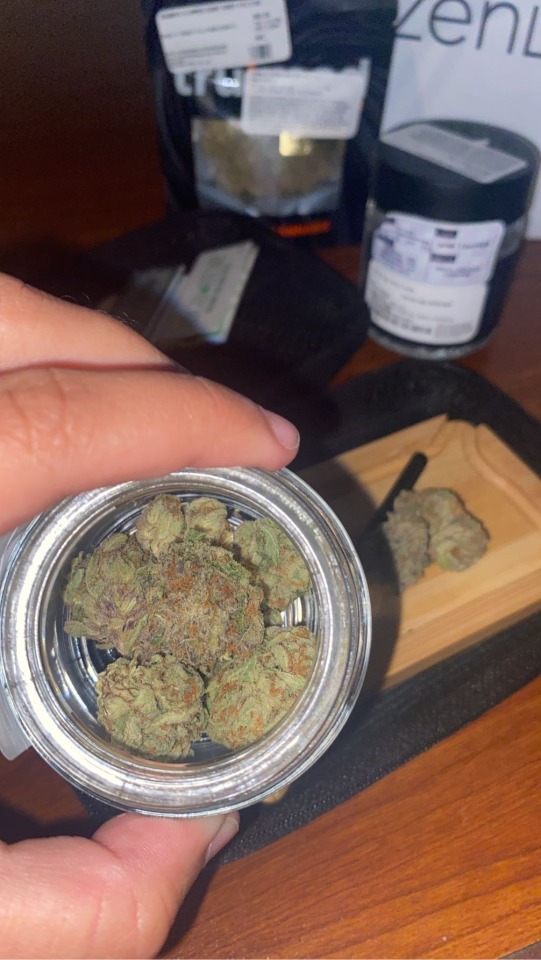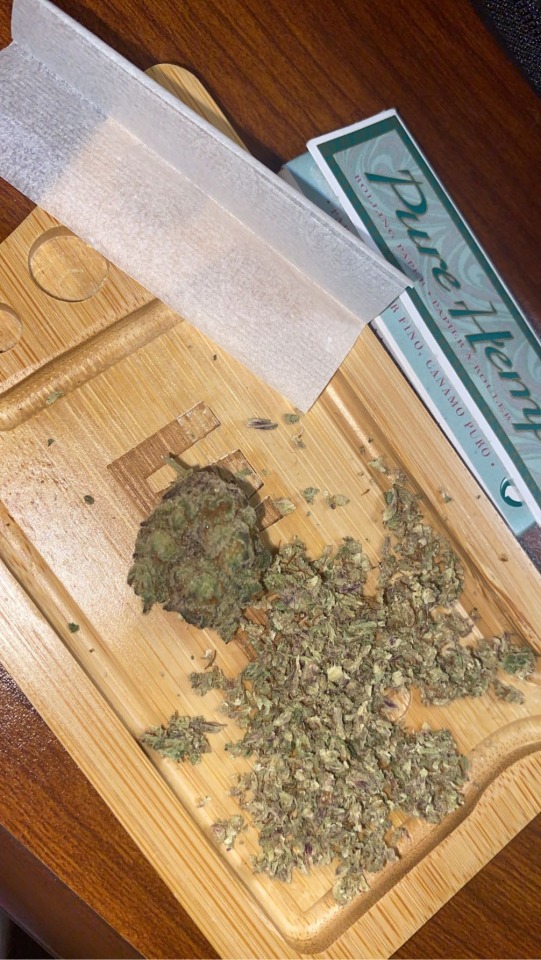#Arizona marijuana
Text
Arizona tried adding equity into marijuana licensing. Dispensary chains still took over
Would-be partners have offered Abel Ochoa “crazy amounts of money” for the social equity marijuana license he and his cousin own.
“I had somebody offer me $17 million,” he said, laughing. “If I would’ve just took the money, like yeah, that would’ve been nice. But what, what would’ve been the purpose behind it?”
He and his cousin, Diana Pineda, turned them all down. Ochoa instead borrowed a…

View On WordPress
#arizona marijuana#Legal Marijuana#Marijuana Dispensaries#marijuana licenses#marijuana social equity#recreational marijuana
0 notes
Text



quick pick up & shout out to that budtender who hooked me up with the sweetest deals tonight @ local joint by zenleaf
phoenix, az
mix up of confucius kush & kiwi fritter in a lil pure hemp paper🍃
#arizona#stoner#hemp paper#smoke spot#recreational marijuana#photography#roll a joint#cannabis dispensary#cannabis culture#weed strains#mine
52 notes
·
View notes
Text
The cutest dispo bag I've ever gotten!
#girls who smoke weed#cannabis community#smoke weed everyday#mary jane#420daily#blunt#420culture#smoke ganja#smoke a joint#smoking#girls who smoke#girls who like girls#wlw lesbian#wlw#bisexual#rong bips#bi#bong hits#joint#bud#wake and bake#weed dispensary#cannabis dispensary#marijuana dispensary#arizona desert#dabs#dab#desert#desert life#desert photography
3 notes
·
View notes
Text

Legalization Weed in Arizona state!
Weed is completely legal in Arizona. You should be having a legal valid medical marijuana license to enjoy the weed in Az.
Arizona Medical Marijuana Card is an important document issued by a valid medical marijuana doctor.
LEARN MORE!
21 notes
·
View notes
Text
Unveiling the Therapeutic Benefits of Medical Marijuana
Medical marijuana, derived from the cannabis plant, has garnered attention for its potential therapeutic properties. As attitudes and regulations surrounding its use continue to evolve, it's essential to explore the compelling benefits this natural remedy offers. In this blog post, we delve into the various ways medical marijuana can positively impact health and well-being, shedding light on its potential as an alternative treatment option.
Pain Management:
Alleviating Chronic Pain: Discover how medical marijuana can provide relief for individuals suffering from chronic pain conditions, such as arthritis, fibromyalgia, and neuropathy.
Reducing Inflammation: Explore the anti-inflammatory properties of cannabinoids, which may help ease symptoms associated with conditions like multiple sclerosis and inflammatory bowel disease.
Mental Health Support:
Anxiety and Depression Relief: Learn how certain compounds in medical marijuana, such as cannabidiol (CBD), may offer a natural approach to managing symptoms of anxiety and depression.
PTSD and Trauma Recovery: Uncover the potential of medical marijuana in helping individuals cope with post-traumatic stress disorder (PTSD) and trauma-related conditions.
Nausea and Appetite Stimulation:
Cancer Treatment Support: Discuss the role of medical marijuana in mitigating chemotherapy-induced nausea and vomiting, as well as stimulating appetite for individuals undergoing cancer treatments.
HIV/AIDS Symptom Management: Explore how medical marijuana may alleviate symptoms like nausea, weight loss, and appetite loss in individuals living with HIV/AIDS.
Neurological Disorders:
Epilepsy Management: Learn about the promising effects of medical marijuana, particularly CBD, in reducing seizures in individuals with epilepsy.
Multiple Sclerosis Symptom Relief: Discover how medical marijuana may help manage symptoms like muscle spasticity, pain, and sleep disturbances in individuals with multiple sclerosis.
Sleep Disorders:
Insomnia Treatment: Explore the potential of medical marijuana in improving sleep quality and alleviating insomnia symptoms, promoting restful and rejuvenating sleep.
Palliative Care and End-of-Life Support:
Comfort and Symptom Management: Discuss how medical marijuana can provide comfort and relief to individuals in palliative care, easing symptoms like pain, nausea, and anxiety in the final stages of life.
Potential Adjunct Therapy:
Reduced Reliance on Opioids: Highlight the possibility of medical marijuana serving as an adjunct therapy for chronic pain management, potentially reducing the need for opioid medications.
Medication Side Effect Mitigation: Discover how medical marijuana may help alleviate side effects associated with certain medications, improving overall treatment experiences for individuals.
Medical marijuana holds immense potential as a natural treatment option for various health conditions. From pain management and mental health support to alleviating nausea, stimulating appetite, and providing relief for neurological disorders, its benefits are broad and diverse. As research and understanding continue to evolve, medical marijuana has the potential to transform the lives of countless individuals seeking alternative approaches to their well-being. Embrace the therapeutic benefits of medical marijuana and engage in informed discussions with healthcare providers to determine if it's a suitable option for your unique needs.
#phoenix arizona#phoenix az#phx#phxaz#arizona#tucson#scottsdale#health#telehealth#medical marijuana#cannabis#thc#cannabiscommunity#cbd for anxiety#ganja#cbd gummies#weed cannabis cannabiscommunity weedporn marijuana thc cbd weedstagram stoner cannabisculture ganja hightimes indica life sativa kush maryj#pot
6 notes
·
View notes
Text
Get Arizona Medical Marijuana Card Eligibility
Do you want to know about Arizona medical marijuana card eligibility? We have got you covered. You must be 18 – 20 years old years or older to apply (Recreational only available for 21+ years of age only). The process of obtaining a card involves getting a doctor’s recommendation and registering with the state. While some patients may choose to consume cannabis recreationally, having a medical marijuana card offers a number of benefits. For more information, you can call us at 602-857-7470.
#Arizona medical marijuana card eligibility#Arizona marijuana card fees#Arizona marijuana card renewal
0 notes
Text
The racist time and tone based on a true story of why marijuana was made and classified as illegal.
https://youtu.be/ZJMeTR227h8?si=li2MAgjPeFcYy_Qd
#@OGKzone @ogkzone responsiveness#achieve#Alabama#Alaska#Arizona#Arkansas#BLM#blog#bmajor$oul#California#cannabis#Colorado#Connecticut#Delaware#education#energy#Florida#harmony#harryjanslinger#Instagram#jazz#Learning#link#louisarmstrong#Louisiana#Maine#Man#marijuana#Maryland#Massachusetts
0 notes
Text
Understanding Medical Marijuana Laws in Arizona: A Comprehensive Guide
Medical marijuana laws in Arizona have sparked debates and discussions nationwide, as the state's approach to cannabis regulation continues to evolve. From the Arizona Medical Marijuana Act (AMMA) to recent legislative updates, navigating the legal framework surrounding medical cannabis can be complex. This article aims to provide a comprehensive overview of medical marijuana laws in Arizona, covering key provisions, qualifying conditions, patient rights, and more.
Arizona's journey with medical marijuana legislation began in 1996 with the passage of Proposition 200, which allowed doctors to prescribe controlled substances for medicinal purposes, including marijuana. However, it wasn't until 2010 that Arizona voters approved the AMMA, legalizing the medical use of marijuana for qualifying patients with certain debilitating medical conditions. Under the AMMA, patients diagnosed with specific conditions, such as chronic pain, cancer, HIV/AIDS, glaucoma, and PTSD, can obtain a medical marijuana card to access cannabis products from licensed dispensaries.
To qualify for medical marijuana in Arizona, patients must have a certified medical condition diagnosed by a licensed physician. The state maintains a list of qualifying conditions, and patients must obtain a written certification from their physician to apply for a medical marijuana card through the Arizona Department of Health Services (ADHS). Once approved, patients can possess up to 2.5 ounces of usable marijuana within a 14-day period or cultivate up to 12 plants for personal medical use if living more than 25 miles from the nearest dispensary.
Dispensaries play a crucial role in Arizona's medical marijuana program, providing patients with access to a variety of cannabis products, including flower, edibles, concentrates, and topicals. These dispensaries must adhere to strict regulations set forth by the ADHS, ensuring product safety, security, and quality control. Patients can purchase medical marijuana products from licensed dispensaries after presenting their medical marijuana card and valid identification.
While medical marijuana laws in Arizona offer legal protections for qualified patients and caregivers, there are limitations and considerations to keep in mind. Employers are not required to accommodate on-the-job marijuana use, and federal housing laws may prohibit medical marijuana use in federally subsidized housing. Additionally, transporting marijuana across state lines or into federal facilities remains illegal under both state and federal law.
In conclusion, understanding medical marijuana laws in Arizona is essential for patients, caregivers, and stakeholders in the cannabis industry. By familiarizing themselves with the AMMA, qualifying conditions, patient registration process, possession limits, and dispensary regulations, individuals can navigate the legal landscape surrounding medical cannabis with confidence. As attitudes toward marijuana continue to evolve, staying informed and advocating for responsible cannabis use remain paramount in shaping the future of medical marijuana laws in Arizona.
1 note
·
View note
Text
Arizona is oversupplied with marijuana as brands seek shrinking shelf space in dispensaries
When marijuana was outlawed in Arizona, smoking the plant’s flower was the primary way to feel its effects.
Now adults and medical patients can instead choose vape pens, gummies and even beverages.
Machinery filled and sealed a long line of tall slender cans made and sold by the Flower Shop AZ on a recent Thursday morning.
The ingredients are flavored water, some of the psychoactive chemical THC…

View On WordPress
0 notes
Text
Wake N bake

#legal marijuana#love#smoke sesh#good morning#arizona#alonetime#tv#apple tv#joint#travel#smokers#angel numbers
0 notes
Text

With Marijuana Evaluations, you are in safe hands. Our friendly platoon is devoted to helping cases navigate the complications of medical cards Arizona, furnishing compassionate care and backing throughout the entire instrument process.
0 notes
Text
Arizona’s Legislation History!
In 1996, voters legalised medical marijuana through an initiative allowing individuals with terminal illnesses to obtain medical cannabis with a doctor's prescription.
However, this clause was struck down since the word "Prescription" was against federal regulations.
Later in 2002, the state attempted to decriminalize medical cannabis once more, but it received just about 42.7% of the vote.
Since this was not subject to a majority vote, it took ten years until a workable solution was accepted.
Proposition 203 was heavily altered in 2010, and voters approved the Arizona Medical Cannabis Question. This was approved by a mere 0.13% margin of victory, totaling 50.13% votes. Even after Proposition 203 was approved, the desired result was still not achieved; the first medicinal cannabis sale did not take place until December 2012.
The Arizona Department of Health Services, which is in charge of developing and enforcing the state's Medical Marijuana Program rules, is honored by the designation "Proposition 203." The department establishes strict requirements for authorized medical dispensaries to operate and for qualified patients and their approved caregivers to access medical cannabis.
The Smart and Safe Act was listed as Proposition 207 on the election ballot in November 2020. Voters approved decriminalizing adult use of recreational marijuana.
Learn more by visiting our website - CLICK HERE
2 notes
·
View notes
Text
Medical Marijuana Program in Arizona
The Arizona Medical Marijuana Program was established in 2010 after voters approved the Arizona Medical Marijuana Act (AMMA). Patients with certain qualifying medical conditions can use medical marijuana as a treatment option under the program. Patients must have a recommendation from a licensed physician and submit an application to the Arizona Department of Health Services to participate in the program (ADHS). Patients who have been approved are given an ID card that allows them to buy and possess up to 2.5 ounces of marijuana every two weeks. Cancer, glaucoma, HIV/AIDS, and chronic pain are among the qualifying medical conditions listed in the AMMA. For patients who live more than 25 miles from a licensed dispensary, the program also allows for home cultivation of up to 12 plants. The program has seen significant growth since its inception, with over 290,000 active cardholders as of 2021. However, the program has also faced legal challenges and regulatory changes, including a recent court ruling allowing dispensaries to sell non-smokable cannabis products. Overall, Arizona's Medical Marijuana Program provides patients with a legal and regulated pathway to medical cannabis as a treatment option for qualifying medical conditions. Call (480) 466-7038
0 notes
Link

0 notes
Text
Get Arizona Marijuana Card Online
Apply for an Arizona marijuana card online at Cardmmjonline.com!! We are your right stop. In honor of 420, we have an exclusive offer for you that not only give you a great price on your card but also a killer deal from our friends at Cannabist Dispensary located in Tempe, Arizona. We ensure the most trusted and high-rated card service to meet your expectations and desire. For more information, you can call us at 602-857-7470.
0 notes
Text

With the legalization of medical marijuana in Arizona, more and more individuals are seeking MJ evaluations and/or getting their Arizona medical marijuana card. There are multiple steps involved with obtaining a medical marijuana card and it is important to understand the process before beginning. The following guide will help you understand what’s involved in applying for your medical marijuana card in Arizona.
The Qualifying Conditions
In order to receive a medical marijuana card, you must have one of the twenty qualifying conditions as determined by the state of Arizona. These include HIV/AIDS, cancer, glaucoma, PTSD, seizures or chronic pain related to a qualifying condition. You can find a full list of qualifying conditions on the state’s website.
Obtaining Your Medical Marijuana Card
Once you have determined that you meet one of the qualifying conditions outlined above, the next step is to obtain your medical marijuana card. In order to do so, you must first schedule an appointment with an authorized doctor who specializes in cannabis evaluations. During this appointment, they will assess your health condition and determine if you are eligible for a medical marijuana card. Once approved, they will provide you with documentation that includes your doctor’s recommendation and other details about your health condition that may be relevant for obtaining your medical marijuana card. Applying for Your Medical Marijuana Card
After receiving documentation from your doctor that confirms you meet the criteria for a medical marijuana card, you can then apply online through the Arizona Department of Health Services website or through mail-in applications available at any local county health department office. You will need to provide all necessary documentation as outlined on their website including proof of residency such as two forms of identification and proof that you are over 18 years old (if applicable). All documents must be up-to-date and valid from when they were issued until now. Once all documents have been submitted and approved, your application will be processed within 7 days and once approved, you will receive your official Arizona Medical Marijuana Card via regular mail or email depending on how quickly it is needed; both methods require additional fees that may vary depending on where you live and when it needs to be delivered by.
#Arizona medical marijuana card#medical marijuana card#medical marijuana doctor#marijuana doctor#medical marijuana
0 notes